On Shaky Ground
In Yunnan province, mining operations cause villagers to fear for their lives.
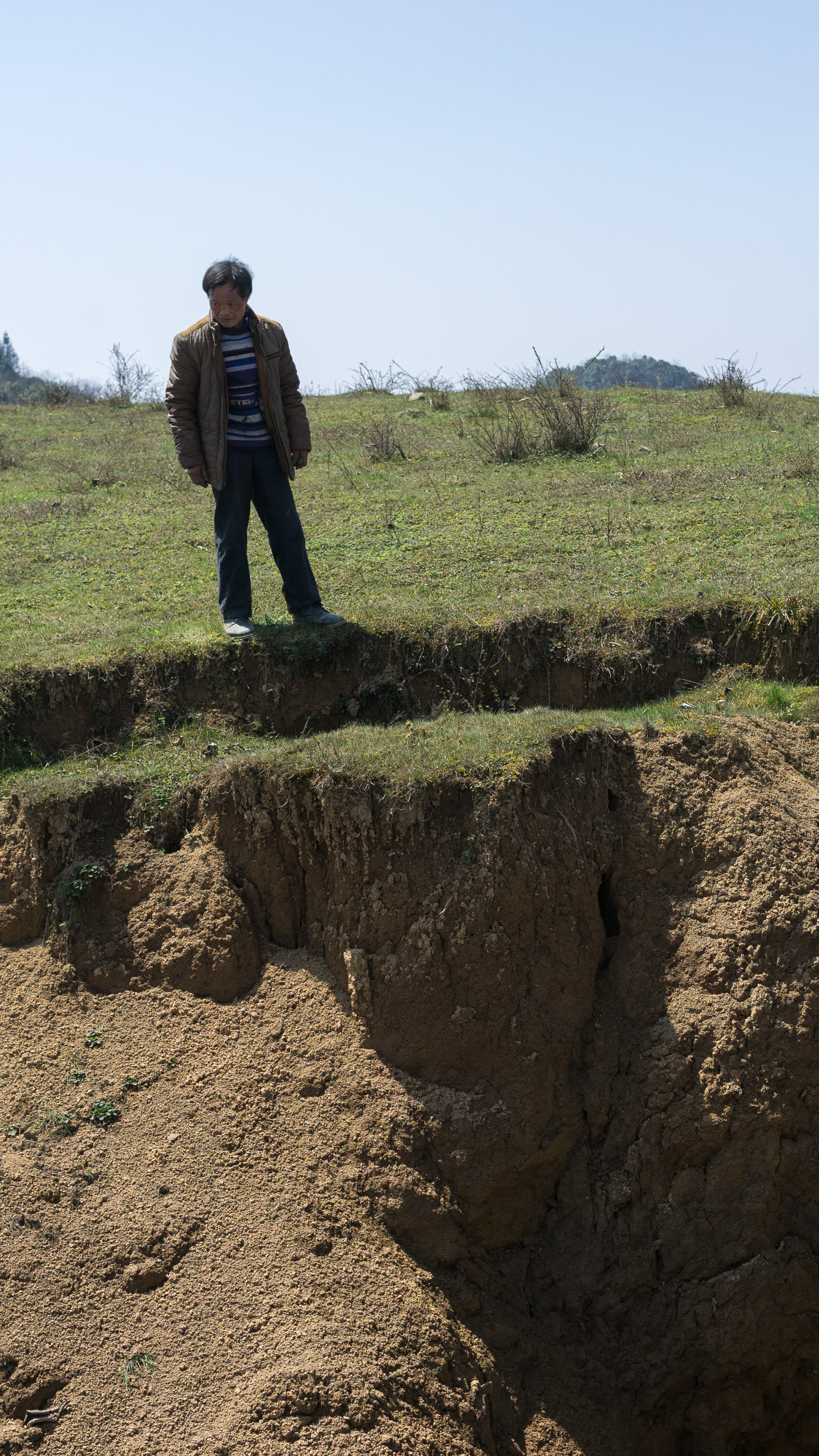

YUNNAN, Southwest China — Late into the night, Zhang Gonghua studied a government-issued booklet on disaster preparedness. In comic-like drawings, one chapter explained the warning signs of an imminent landslide. Zhang was puzzled.
The drawings matched the changes he had seen on the mountain where he lives, and the booklet also mentioned the dangers of mining. Then, he connected the dots: the fissures in their houses and the land, the disappearance of the mountain springs, the vast coal mine underneath the village — and the looming likelihood of a landslide.
“The pictures in the booklet look like what’s happening on our mountain,” says Zhang, the village head. “I realized how dangerous it is.”
Without GPS coordinates, Xiaotun Village is almost impossible to find on a map. Located in a remote and mountainous pocket of Zhenxiong County in northeastern Yunnan province, it’s home to just over a dozen families living in stone houses, with thatched roofs protecting them from wind and rain. The last home at the edge of the village sits at an altitude of just under 2,000 meters, an hourlong hike from the nearest road.
Overgrown with high grass and often shrouded in mist, the village’s steep slopes are eerily beautiful. Yunnan is known for mountainous scenery like this, but it’s also what makes the province dangerous, says Tan Shucheng, director of Yunnan University’s School of Resource Environment and Earth Sciences.
“Many mountains in Yunnan are prone to landslides,” Tan says, explaining that steep slopes like the ones found here are a prerequisite for such disasters.
Landslides can be triggered by earthquakes, heavy rains that weaken the soil, or a combination of factors. In 1920, an earthquake in northwestern China triggered a landslide that killed 180,000 people — the world’s deadliest landslide, according to Guinness World Records. More recently, landslides caused by an Aug. 8 earthquake in Yunnan’s neighboring Sichuan province killed 25 people, just weeks after another Sichuan landslide caused 15 deaths following heavy rains. In a village near Xiaotun, 18 children and one adult died when a school was buried by a landslide in 2012.
There are no reliable statistics on landslides in China, but according to data compiled by Shanghai’s Tongji University and Sixth Tone’s own research, at least 352 people have died in landslides since 2008 in Yunnan alone.
It’s easy to shrug off landslides as natural occurrences, unavoidable disasters for which there is no one to blame. But that’s not always true: Some of the world’s deadliest landslides have been caused — and could have been prevented — by humans.
Construction can destabilize slopes, as can the removal of trees and other flora whose roots help hold the soil together, Tan says. By and large, however, mining is the human activity most commonly associated with landslides. And while mines around China are falling into disuse as the country moves toward cleaner forms of energy, they continue to destabilize the ground above. Xiaotun Village is a case in point.
At 60 years old, Zhang is remarkably spritely. He smokes as he climbs up and down the mountain — never short of breath — and he’s intent on pointing out every sinkhole in the ground, every crack in the nearby houses, and every fissure in the earth.
The mine that runs underneath the village received its safety permit in 2005, and the first available output figures date back to 2006. “Three years after the mine opened, there were holes everywhere on our mountain,” Zhang says, staring down one sinkhole so big that a house could fit inside.
Dozens of other sinkholes of various sizes dot the surrounding mountainside. One swallowed a field that grew potatoes and green onions. A dog fell into another, Zhang recalls, but it was rescued by villagers who tied ropes around their waists and rappelled down into the hole.
At first, villagers tried not to worry too much, but soon after the sinkholes opened, fissures started to appear in the ground. Then came the cracks in the walls and floors of local houses. They grew wider, longer, and deeper, says Xiaotun villager Zhang Gongyuan, a father of two who is not related to Zhang Gonghua. “We are very worried that the house will collapse because of the cracks,” he says of their family home, “and that the land will cave in.”
Next, the water disappeared. Villagers say that for as long as they can remember, springs near the peak of the mountain provided the water they needed to irrigate their farmland, cook, and wash. Before the advent of the mine, the villagers thought these springs were inexhaustible.
Now that the springs have been gone for a year, the villagers have learned to cope, using wicker baskets covered with plastic sheets to fetch water from the river that cuts through the valley. One basketful lasts a small-scale farmer no more than a day, and it takes at least half an hour to haul it up the mountain, says Wu Fubi, a 46-year-old villager who lives on her own. “I try to [collect water] when it’s dry outside, so it’s easier to carry the basket,” she says. Around her house, she has set up containers to store water.
The villagers say there’s less food each year, partly because some of their fields have been swallowed by sinkholes, and partly because they don’t have enough water to grow vegetables.
In hindsight, Zhang Gonghua understands that the workers who arrived on the mountain 10 years ago heralded fundamental and irrevocable change. Donning green and red helmets, they paid the villagers 10 yuan ($1.50) a day to help carry their equipment, offering no explanation of why they were drilling holes in the ground.
For centuries, mining has been the leading industry in Yunnan, whose land is rich in gold, tin, copper, zinc, lead, and aluminum. Even Kublai Khan, the grandson of Mongol warlord Genghis Khan, was drawn there eight centuries ago to unearth the region’s massive silver deposits.
Besides metals, there’s another resource that promises big profits: coal. Last year, the central government asked that provincial governments cap coal production at 20.88 million tons per year. Yunnan didn’t comply: For 2018, it has capped production at 70 million tons, more than three times higher than the central government’s recommendation. It’s also significantly higher than the 42.5 million tons of raw coal that Yunnan produced in 2016.
Coal has provided work for hundreds of thousands of unskilled laborers in the province — as it has across the country — and the industry has helped Yunnan’s GDP growth outpace the national average since 2008. In areas like Zhenxiong County, where more than 17 percent of the population lives below the poverty line, coal mining provides a vital income.
In 2010, Zhaoyuan Coal Mine Co. — which operates the mine on which Xiaotun Village sits — was given provincial government permission to upgrade its production to 300,000 tons per year, representing an increase of more than seven times, government documents show. The private company invested more than 110 million yuan into the expansion, which made the mine one of the biggest in the entire province.
When Sixth Tone visited the mine, it was bustling with workers. Coal trundled out of the mountain on conveyer belts, and trucks flowed in and out of the high gates, transporting shiny lumps of “black gold,” as the fuel is often termed in China.
The company’s phone lines were less active. An employee hung up during one phone call with Sixth Tone, and subsequent calls went unanswered, as did a written request for comment.
There is little information available on the link between mines and landslides in China, and several Chinese experts declined interview requests. Having seen satellite images, Joseph Wartman, a landslide expert and associate professor of civil and environmental engineering at the University of Washington, says that the problems the Xiaotun villagers described are classic examples of mining effects.
“They are correct in that these problems are directly related to the mine,” Wartman says. He explains that landslides don’t endanger people if the proximity of mines to residential areas is tightly regulated.
In uninhabitated areas, mining operations often risk triggering landslides inside the mines, as the cleanup costs are offset by the promise of higher profits from excavating more resources.
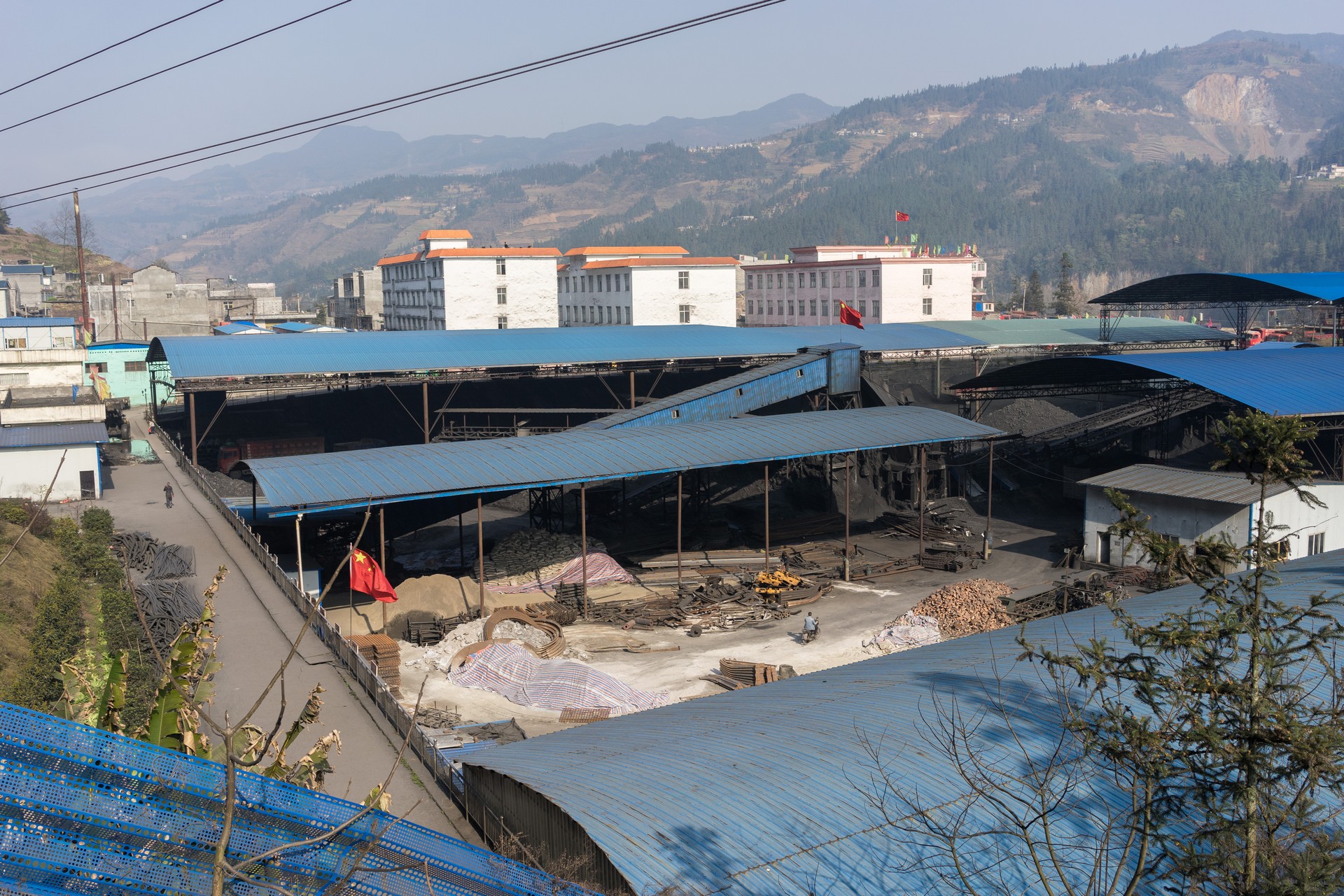
Coal transport facilities at the Zhaoyuan Mine in Pingshang Township, Zhenxiong County.
Thanks to modern warning systems that allow mining companies to measure even the tiniest trembles in the earth, mines can be evacuated days before landslides. These early warning systems can cost more than a million dollars.
In China, even experts like Tan are unaware of this technology. Without early warning, the chances of surviving a landslide are slim: Landslides can exceed 55 kilometers per hour, around twice the average speed of a sprinting human.
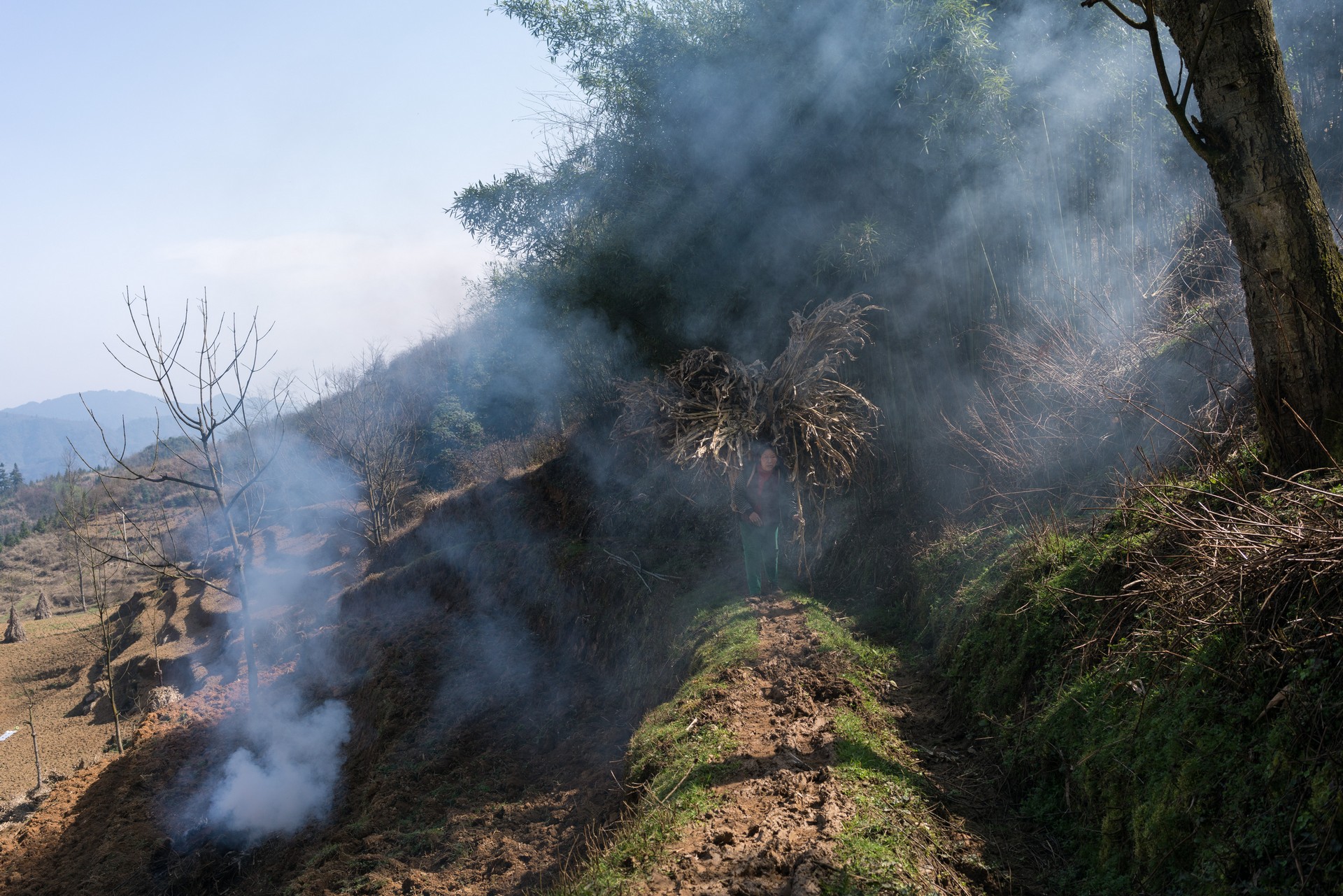
A villager carries hay along a mountain path.
Wartman, who has worked in China, says he is not surprised by the issues that the Xiaotun villagers report. “A lot of these enterprises are not properly regulated,” he says. “Villages are of secondary or tertiary concern.”
But while open-pit mines often trigger landslides, these disasters are less commonly associated with underground mines like the one beneath Xiaotun. To Wartman, the sinkholes and cracks in the village houses are of greater, more immediate concern.
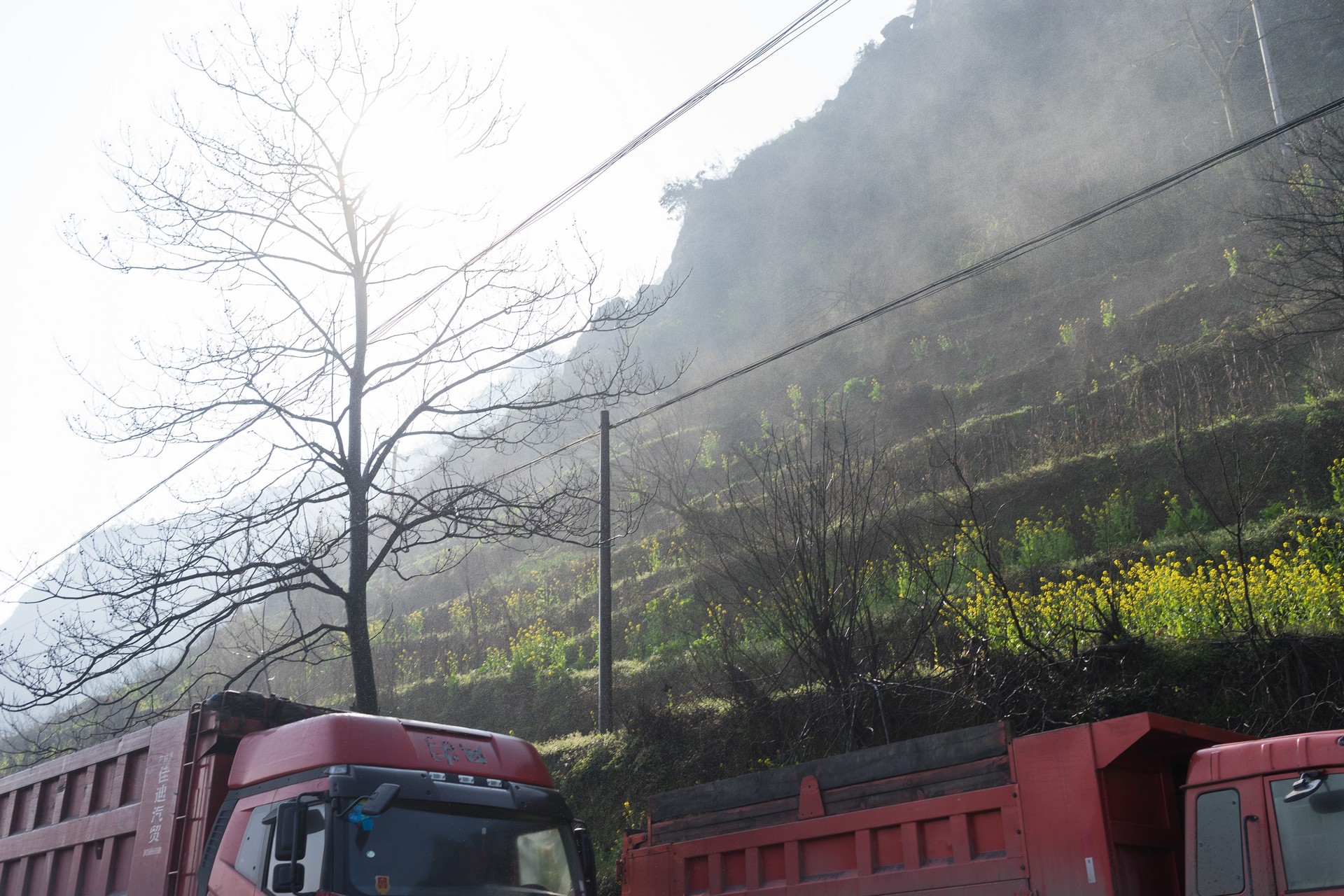
Trucks parked at the foot of the mountain where the Zhaoyuan Mine is located.
Still, the villagers’ fear of a landslide isn’t groundless, he says. Cracks and sinkholes can collect rainwater that would otherwise drain away, thus weakening the soil, which increases the possibility of landslides. “Will the mining cause landslides? It could. It’s not far-fetched,” Wartman says.
Contributing to the Xiaotun villagers’ worries is the deadly landslide that occurred in the same county in 2013. In the aftermath, survivors told media that the Gaopo Village coal mine had started to dig ever closer to their homes, and that fissures had appeared in the soil. “Big enough to swallow a bull,” one survivor told state news agency Xinhua, referring to the cracks. One rainy day, farmers heard explosions at the mine. Moments later, a landslide buried the whole village, killing a total of 46 people. Nineteen of them were children.

Coal waste sits beside safety warning signs at the Zhaoyuan Mine.
Survivors blamed the coal mine for the disaster, but within just a few days, state media outlets reported that a team of investigators had deemed the cause of the landslide “natural.” The mine, experts reaffirmed during a press conference, had played no role.
Whether a wave of earth and rock or the ground itself will swallow Xiaotun Village, to residents, it’s all the same. They stopped feeling safe in their own homes a long time ago. Now, they hope that the government will save them.

Zhang Gonghua uses a stick to demonstrate the depth of a crack inside a house.
“See, that’s my name right there,” village head Zhang Gonghua says, pointing to a pile of petitions Xiaotun has filed with the local government. Since the first fissures appeared, elderly villagers have traveled to various authorities pleading for help. Zhang Gonghua lists them out: the Pingshang Township government; the Zhenxiong County government; the city of Zhaotong, which administers the county. Once, they even sent a relative to Yunnan’s provincial capital of Kunming, almost 600 kilometers away, only to be directed back to the local government.
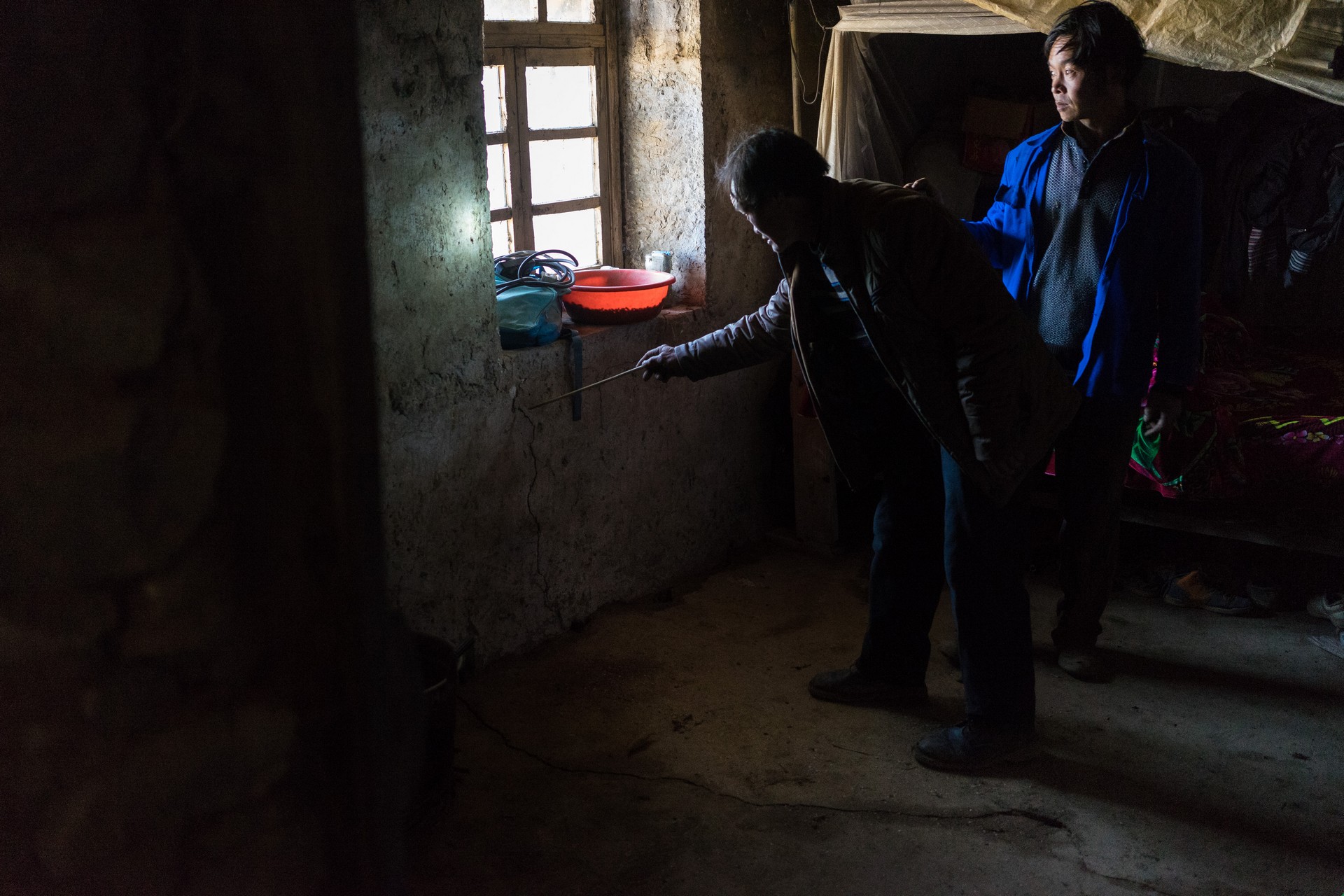
Zhang Gonghua points to a crack in a wall.
At every stage of their petition, the villagers were told that these things occurred naturally and were unrelated to the mine, Zhang Gonghua says. Township officials, employees in the town’s land and resources bureau, and authorities at the county and municipal levels contacted by Sixth Tone either declined to comment, said they weren’t authorized to speak on the matter, or referred questions to other departments. Sixth Tone’s written requests for comment also went unanswered.
Zhang Gonghua recalls officials saying that if the villagers were really so concerned about the safety of their homes, they could sleep in tents instead. They were handed light blue tents, tall enough for a person to stand in. Written on the sides were the Chinese characters for “disaster preparedness.”
“The first few times it rained, we stayed in the tents,” Zhang Gonghua recalls. “But it’s been two years now.” The tents offered barely any warmth during the night, when temperatures in the mountainous region plummet. Moreover, the tents would only protect villagers from collapsing houses, but would make them even more vulnerable to landslides and other disasters. Now, the faded tents are used to store hay and chicken feed.
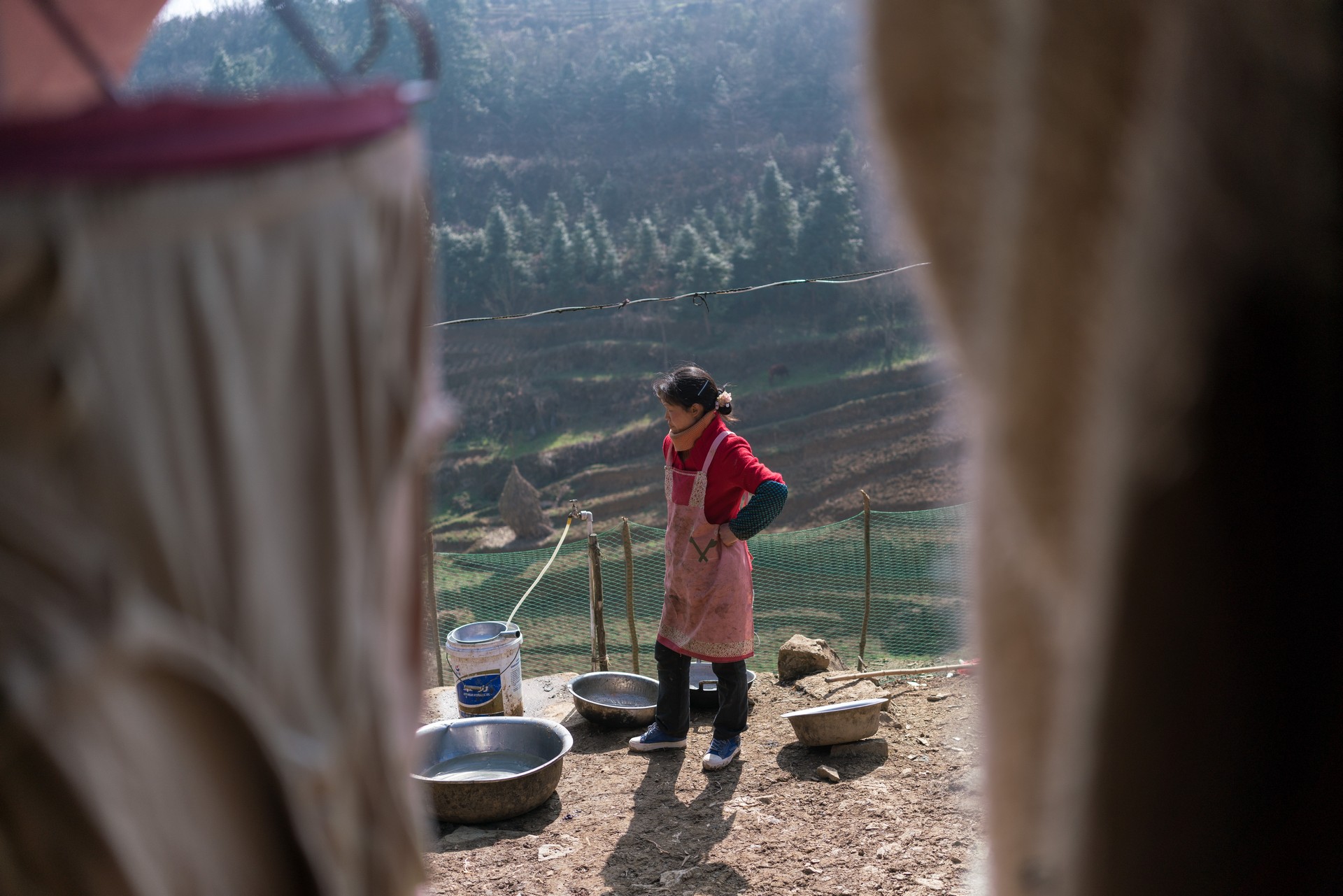
Wu Fubi stands in front of her house in Xiaotun Village. Since the mountain springs disappeared, she must collect water from the foot of the mountain almost every day.
Initially, Xiaotun villagers couldn’t make sense of the phenomena. Some weren’t sure whether to believe the authorities, who were still adamant that there was no reason to worry.
When they first complained to officials, the villagers hoped that the mine would be ordered to stop its operations. They pointed to the springs that had been depleted by mining activities.
Authorities repeated their previous assurances that they were dealing with natural disasters unrelated to the mine. If they wanted to shut down the mine, the villagers were told, they could hire their own scientists to prove a connection. To reassure the villagers, authorities gave them a booklet on disaster preparedness.
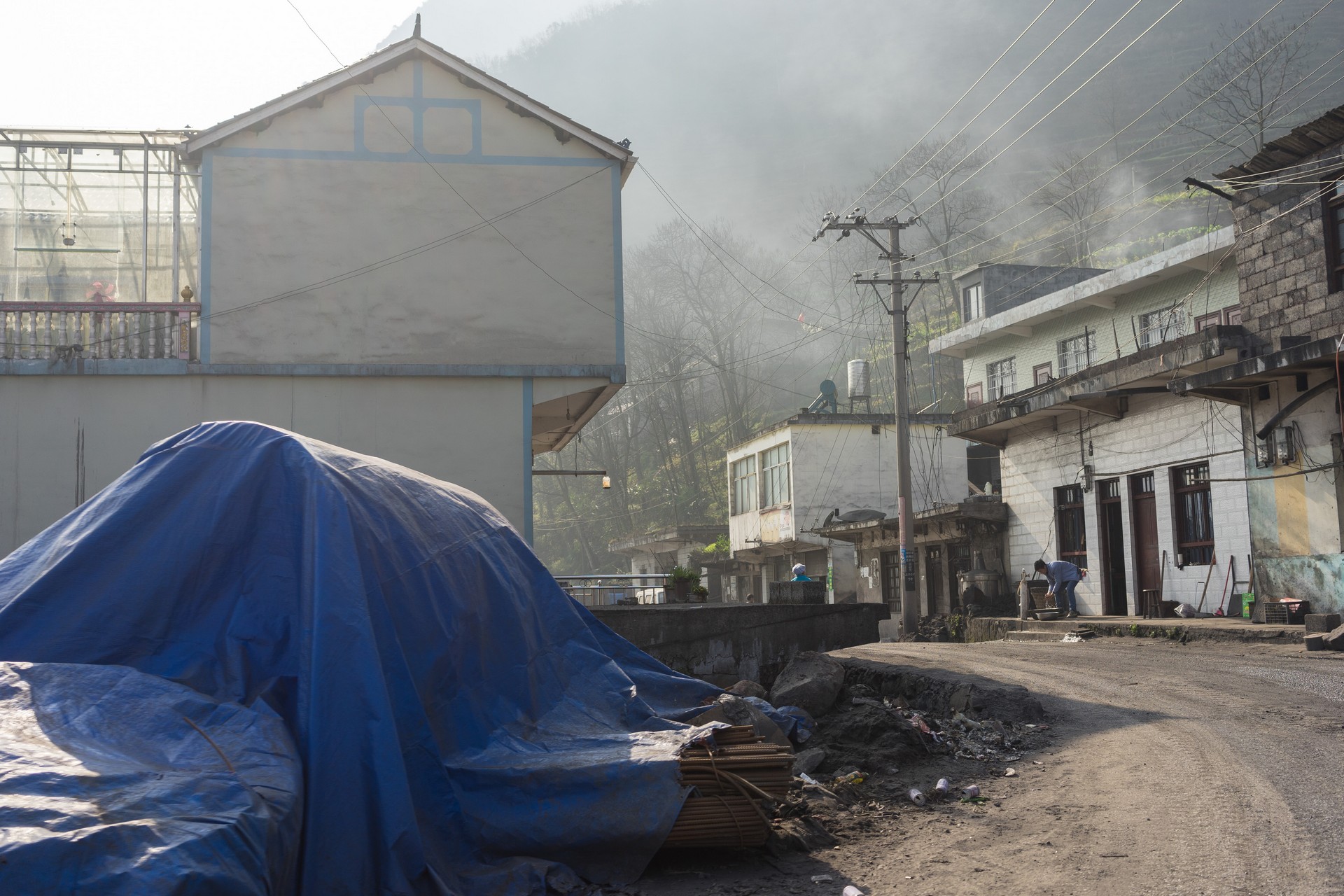
A view of a village in Pingshang Township, Zhenxiong County.
“The local land management bureau gave us the brochure when the mountains started to crack, so that we would know when to escape if the mountain moves,” Zhang Gonghua says as he flips through the pages.
One drawing urges villagers who have noticed cracks in the earth or in their homes to immediately notify the local authorities. Zhang Gonghua did as instructed. “All the signs — they were all there, so we went to the government again to tell them about it,” he says. “They said the mountain is big and strong, and that nothing will happen.”
But even if mining in the area ceased, that wouldn’t guarantee the villagers’ safety: Mines can cause landslides and other disasters years after they’ve stopped operating, Wartman says. The safest option, he says, is for the villagers to leave.
Relocating villagers from disaster-prone regions is common in China. In June, Yunnan’s provincial government announced that it would fully relocate 100,000 people from zones classified as prone to natural disasters — including landslides — to new homes in areas deemed safe. Xiaotun wasn’t one of the areas marked as vulnerable.
The villagers did, however, receive an offer: 60,000 yuan for each Xiaotun household that wants to relocate on its own. Their thatched-roof homes might not be worth much more, but the sum wouldn’t cover the cost of buying a new house or a plot of land in a safer area. “We’d have to borrow money from the bank to build a new home, but we’d also lose our land and our income,” says Zhang Gongyuan, the young father of two. “So how could we pay back the bank?”
Rain used to be a blessing in Xiaotun: It meant a better harvest. It meant that villagers wouldn’t have to haul buckets of water back and forth from the springs. Now, rain triggers an existential fear in the community. Rainwater loosens the soil, and rainy days, the villagers know, are the most dangerous for landslides.
“It’s not safe for us or for any family, but there is nothing we can do,” Zhang Gongyuan says. Zhang Gonghua chimes in: “We are so scared that when it rains, we don’t dare to sleep.” Instead, the villagers monitor the cracks in their homes and the fissures in their land. And through the drumming of the rain, they listen for a sound they hope to never hear: the rumble of the earth moving.

Coal transport facilities at the Zhaoyuan Mine in Pingshang Township, Zhenxiong County.

A villager carries hay along a mountain path.

Trucks parked at the foot of the mountain where the Zhaoyuan Mine is located.

Coal waste sits beside safety warning signs at the Zhaoyuan Mine.

Zhang Gonghua uses a stick to demonstrate the depth of a crack inside a house.

Zhang Gonghua points to a crack in a wall.

Wu Fubi stands in front of her house in Xiaotun Village. Since the mountain springs disappeared, she must collect water from the foot of the mountain almost every day.

A view of a village in Pingshang Township, Zhenxiong County.